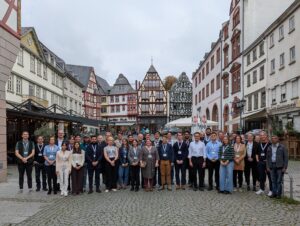
Great work from Ana, Calvin and David!
Abstract: Four pharmaceutically relevant nucleoside analogues (5-fluoro-2’-deoxyuridine, 5-chloro-2’-deoxyuridine, 5-bromo-2’-deoxyuridine, and 5-iodo-2’-deoxyuridine) have been synthesized by using a novel thymidine phosphorylase from H. elongata (HeTP). Following enzyme immobilization on microbeads, the biocatalyst was implemented as a packed-bed reactor for the continuous production of halogenated nucleosides, achieving up to 90% conversion at the 10 mM scale with 30 min residence time. Taking the synthesis of Floxuridine (5-fluoro-2’-deoxyuridine) as study case, we obtained the highest space-time yield (5.5 g/L/h) reported to date. In addition, bioinformatic tools such as MD analysis and CapiPy have contributed to shine light on the catalytic performance of HeTP as well as its immobilization, respectively.
Read the full paper here



